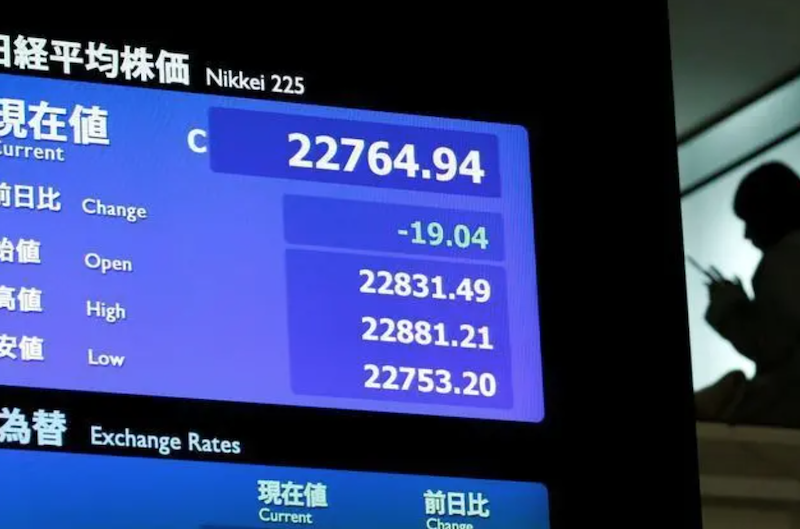Asian stocks were on the front foot on Thursday with investor mood lifted by Beijing’s stimulus rollout and by the Bank of Japan moving to calm fears over rapid tightening plans.
Chinese shares managed to hold onto their gains this week off the back of a slew of measures to revive market sentiment ahead of the week-long Lunar holiday, while the Nikkei vaulted to new heights after the country’s central bank ruled out rapid rate hikes.
Japan’s Nikkei share average closed at its highest level in 34 years, surging more after a high-ranking Bank of Japan (BOJ) official signalled that any policy tightening would be gradual.
Also on AF: China’s Electric Vehicle Sales Fell 37% in January from December
Japanese stocks had already started the day well, following a tech-led rally on Wall Street overnight.
The Nikkei ended the day up 2.06% at 36,863.28, the highest close since February 1990, when the country’s so-called “bubble” economy was just starting to deflate. The broader Topix was ahead 0.50%, or 12.68 points, to 2,562.63.
The yen slid against major peers, providing an additional tailwind for the exporter-heavy Nikkei. A weaker currency inflates the value of overseas revenue and makes products more competitive.
Japanese government bond yields flipped from an early rise to fall across maturities.
Foreign investors have been a major driver of the Nikkei’s more than 10% surge this year, which has easily outpaced major global rivals, including the US S&P 500 and Nasdaq Composite.
China shares rose too after Beijing appointed a veteran regulator as the new securities watchdog head and policymakers took measures to stabilise the sluggish stock markets.
China’s cabinet replaced Yi Huiman as chairman of the China Securities Regulatory Commission (CSRC) with Wu Qing, a veteran regulator with a reputation for tough action.
Authorities have taken a slew of measures to rescue the tumbling market, including asking state-investors to buy funds directly to lift the market. Regulators have moved to curb short-selling.
China Consumer Prices
Separately, data on Thursday showed China’s consumer price index (CPI) fell 0.8% in January from a year earlier, the biggest drop since 2009, although on a monthly basis, CPI rose 0.3%, picking up from the previous month.
China’s blue-chip CSI 300 Index was up 0.64%, on course for a fourth straight session of rebound, while the Shanghai Composite Index climbed 1.28%, or 36.21 points, to 2,865.90.
Both indexes are on track for their biggest weekly gain since November 2022, as markets will be closed for the long Lunar New Year holiday from Friday.
The Shenzhen Composite Index on China’s second exchange rallied 3.17%, or 48.42 points, to 1,577.33.
Hong Kong’s Hang Seng Index, however, lost 1.27%, dragged by a 6.8% decline in Alibaba Group Holding, after the internet giant missed analysts’ estimates for third-quarter revenue. Healthcare stocks listed in the territory also lost out.
Elsewhere across the region, in earlier trade, there were also gains in Sydney, Seoul and Manila, though Singapore, Mumbai, Bangkok and Wellington dropped. MSCI’s broadest index of Asia-Pacific shares outside Japan was 0.3% lower.
European markets were set to open higher, with Eurostoxx 50 futures up 0.1%. US futures were mostly flat.
On Wall Street, the S&P 500 closed at a record high, buoyed by strong earnings from Chipotle Mexican Grill and Ford Motor, which offset jitters about US regional banks.
US Dollar Steady
Shares of New York Community Bancorp closed higher after the lender appointed a new executive chairman and said it could cut exposure to the commercial real estate segment.
On the rate front, a slew of Federal Reserve officials said they wanted to hold off on cutting interest rates until they had more confidence that inflation was headed to 2%, but that mostly echoed the recent message from Chair Jerome Powell.
Markets are still pricing in an 80% probability of a rate cut as early as May, with futures implying around 120 basis points of easing for all of 2024, down from 145 basis points late last week.
Treasuries were in a holding pattern. The yield on benchmark 10-year notes was little changed at 4.1076%, after edging slightly higher the previous day. It was still up 7 basis points for the week, reflecting the pushback from Fed on early rate cuts.
The Treasury Department’s record sale of $42 billion in 10-year notes drew strong demand, allaying some of the fears about excess supply in the market.
The dollar was trading in a tight range after recent gains, holding at 104.03 against its major peers.
Oil prices extended gains on Thursday after Israel rejected the latest offer from Hamas for a ceasefire. Brent rose 0.4% to $79.53 a barrel, while US crude edged up 0.4% to $74.16 per barrel.
Key figures
Tokyo – Nikkei 225 > UP 2.06% at 36,863.28 (close)
Hong Kong – Hang Seng Index < DOWN 1.27% at 15,878.07 (close)
Shanghai – Composite > UP 1.28% at 2,865.90 (close)
London – FTSE 100 > UP 0.26% at 7,648.95 (0935 GMT)
New York – Dow > UP 0.40% at 38,677.36 (Wednesday close)
- Reuters with additional editing by Sean O’Meara
Read more:
China Sees Biggest Fall in Consumer Prices Since 2009
Ant Group Sees Quarterly Profit Plummet 92% Year-On-Year
China Appoints New Securities Regulator as Markets Flounder
China Tech Drags on Hang Seng, Nikkei Dips Despite Auto Boost
























